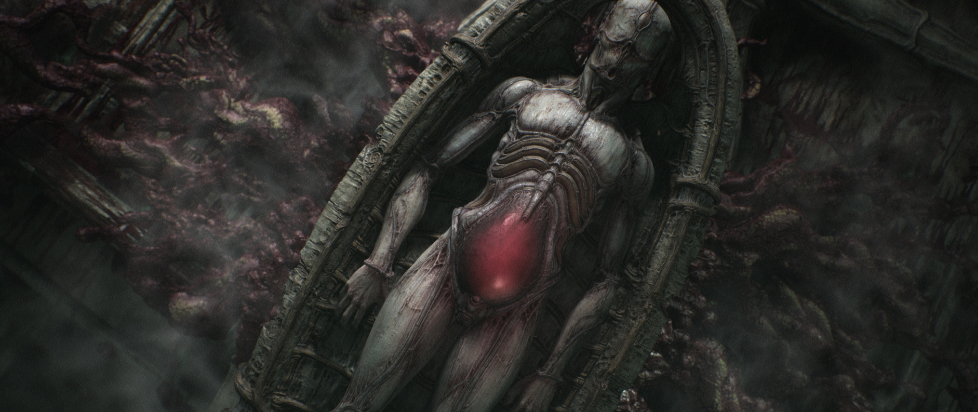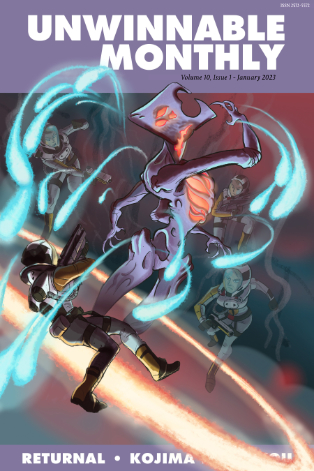
Can Scorn Get Out From Under the Cosmic Horror Legacy?

This column is a reprint from Unwinnable Monthly #159. If you like what you see, grab the magazine for less than ten dollars, or subscribe and get all future magazines for half price.
———
We are what we’re afraid of.
———
So, much like every other horror game fan, I spent a good chunk of hours in late 2021 playing my way through Scorn on Game Pass. The grotesque strangeness of the world immediately engaged me, as only things pulling from H.R. Giger’s body of work can, and while some of the critiques I’ve seen about the clumsiness of some mechanics are valid, I actually think that lends itself to the game’s charm. It’s a game fundamentally about being newly born into a strange world that you know nothing about, so it makes sense that certain things would feel like you’re bumbling through them – your positionality in the game is akin to a very gross and violent toddler (so, a normal toddler on a bad day). If you’ve been following this column up to now, you know that I find inversions of the standard videogame power fantasy to be compelling horror fodder, so I was down with never really knowing what was going to happen when I clicked on an interactable item.
This is not to say, though, that I don’t have certain qualms about the game, though my reservations are necessarily a little more existential than mechanical. While my column last month was all about the horror of the known, Scorn and other sci-fi horror games like it (think Dead Space or Alien: Isolation) rely almost entirely on the horror of the unknown – the unknowable, the inconceivable, and the, well, alien. This type of horror, where the crux of the fear rests on something you fundamentally do not, perhaps cannot, understand, is called “cosmic horror,” and while it’s been effective at terrifying people for decades, it’s got kind of a questionable history behind its popularity.

Cosmic horror was the claim to fame of one H.P. Lovecraft, whose tentacular character Cthulhu has reached meme-fandom fame, and who also wrote such stories as “Shadow Over Innsmouth,” “The Colour Out of Space,” and “Herbert West, Reanimator.” Lovecraft is a foundational figure in horror fiction, and the way the contemporary horror landscape looks in our media owes a lot to him. The issue with this is the same issue you run into with a lot of older media – Lovecraft was very problematic by today’s standards. Actually, by just about any standard – the guy was a raging racist and xenophobe. And his fears about non-white people didn’t just appear in his work, they were a central facet of his horror. In “Innsmouth,” for example, the horror of the story happens to be that (white) humans have been corrupted and perverted by interbreeding with a race of fish people; the story is literally just about Lovecraft’s fear of mixed-race folks, who he saw as inherently inferior. The more you look at Lovecraft’s work, the more the racism jumps out literally everywhere. It’s impossible to avoid and so blatant that it makes enjoying his work pretty uncomfortable – fish people can totally be scary, but not as an allegory for the moral ills of interracial marriage.
Apologies if this feels to some of you like beating a dead horse, but it’s absolutely impossible to discuss space-based and cosmic horror without pointing out that the foundations of the subgenre are racist. When you know that the type of fear modern space-based works are trying to build is modeled after xenophobia, it casts a different light on the fact that every alien you meet is an evil abomination (often one who corrupts human bodies, like the original Xenomorph) that your job is to kill with extreme prejudice.
Scorn is undeniably a different scenario, since you play not as an intrepid human, but as one of the alien creatures, and while there is combat, a lot of the horror is aesthetic and atmospheric – you’re confused and things are gross and hard to understand, which makes for tense times all around. But even with this change in player character, I’m not sure if Scorn does enough to get entirely out from under the legacy of the cosmic horror it relies on. I’m certainly not saying that the game is actively xenophobic in the same way Lovecraft’s work is, and it definitely does not have the same settler-colonial vibes of Dead Space (more on this in a separate column). I guess ultimately, I’m wondering if enjoying cosmic horror at all is always going to involve holding your nose a bit, once you’re aware of the thematic origins of the fear. Is there ever going to be space-based horror that isn’t tinged by a legacy of racism?
———
Emma Kostopolus is an Assistant Professor of English at Valdosta State University. Online, you can find her nowhere, but check out her film reviews for Ghouls Magazine and her recent article for Computers and Composition Online. She’s also the co-author of Ace Detective, a murder mystery dating sim you can play at oneshotjournal.com.




